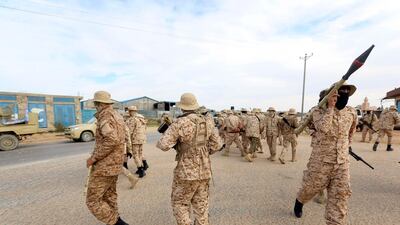The parallels between the events in 2011 that led to Libya’s collapse and the 2003 invasion, from which Iraq has still not fully recovered, would suggest that the world is incapable of learning the lessons of even recent history.
In both cases, western intervention was responsible for the overthrow of a strongman regime. In neither case did anyone appear to have a workable alternative in mind.
Iraq continues to struggle to form a coherent government, with dire consequences for the economy, security and the provision of the most basic of public services, such as clean water.
In Libya, the absence of stable government has not only disrupted basic services but has also transformed the country into a febrile breeding ground for extremists, with catastrophic consequences for the entire region and beyond.
An assault on the foreign ministry in Tripoli in December was the latest in a series of attacks claimed by ISIS.
Like Iraq, Libya has significant oil reserves, which should mean a healthy economy but in the north African country, production and export have been constantly disrupted by militant groups vying for control of facilities.
It has been left to the United Nations, supported by the African Union and the Arab League, to try to align the interests of powerful tribal groups and bring about elections leading to a government of national unity. But progress has been painfully slow.
At a conference in Paris in May, Libya’s competing factions agreed to hold an election in December, a plan that was abandoned in November in the face of power plays by the country’s two rival governing bodies.
Ghassan Salame, the UN special envoy to Libya, has rightly accused the groups of subverting the will of the vast majority of Libyans in pursuit of their own interests.
On Friday, he told the UN Security Council that such gains as had been made in Libya over the past few years were fragile and prey to predators who, if not checked, will find ways to reverse them.
The current mobilisation of troops in the south of the country, in defiance of a ceasefire agreed in September, appears to confirm these fears.
Ultimately, only Libyans themselves can break the country’s political deadlock and, as Mr Salame says, “plot a path out of this malaise, towards stability and prosperity”.
This nation’s hopes now rest on the staging of a UN-backed national conference within the next few weeks, designed to bring all parties together and set the scene for elections in the spring.
Karen Pierce, the UK’s ambassador to the UN, emphasised the need for a broad spectrum of Libyan society, including women, to be represented at the conference.
It is imperative that the multiple factions that constitute the country’s political class, to say nothing of the hundreds of disruptive militias at large, now set aside narrow self-interest and work together for the benefit of the people they claim to represent.
The Libyan people have endured nearly eight years of bloody chaos. It is time to put Libya back on its feet and end their suffering.

